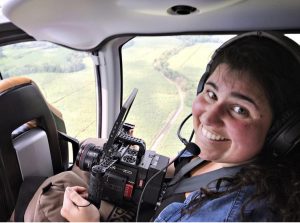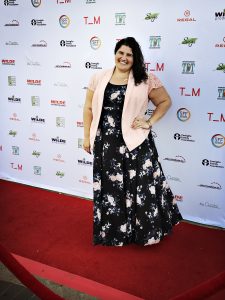40 Gators Under 40 Dietz
The University of Florida Alumni Association named UF College of Journalism and Communications (CJC) alumna Luanne Dietz as one of its “40 Gators Under 40” for 2024.

Luanne Dietz has what it takes to one day be president, college classmate and business colleague Lindsey Samilian Weissmueller, B.S. Telecommunication 2007, wrote in her “40 Gators Under 40” letter of recommendation.
“If you put me in a time machine, sent me 20 years into the future and told me I personally know the president of the United States, I would immediately identify the person for you: Luanne Dietz. I would then celebrate knowing our country was headed in the right direction and in excellent hands,” the casting director wrote.
At 38, Dietz could run for the presidency. But she’s making her mark in the world in many other ways.
Dietz graduated from CJC in 2008 with a bachelor’s degree in Journalism with an emphasis on photojournalism. She has made it her goal to seek out stories with significance and use her camera as a tool to tell them.
The UF Alumni Association member is the founder of Roundbox Productions, a boutique branded-content collective based in Nashville, Tennessee. Previously, she led content strategy at Amazon, as well as human-centric video storytelling for Starbucks. She was the first director hired at CNN’s brand studio, Courageous, where she directed and produced documentaries for Great Big Story and Turner at large.
She has worked as a photo editor and multimedia producer at the San Francisco Chronicle and has multiple years of experience in film and arts education. Her endeavors have taken her around the globe, including extended periods of time in Europe, Africa, China and the Middle East.

The three-time Emmy Award, Cannes Lion and Edward R. Murrow Award recipient is described as a “highly motivated, strategic problem-solver with top-tier analytical and communication skills.”
Journalism Associate Professor John Freeman wrote in his letter of recommendation that “Luanne has been innovative – constantly leading to significant impact for her company, the communication/entertainment industry and society in general.” He noted Cause Beautiful, a not-for-profit she headed that empowered photography as a catalyst for social change. It encouraged inner-city youth to use photography to document their own communities.
What are the main factors that have led to your success?
There is no way I’d be where I am today had I not been willing to say yes and try things that felt non-traditional. When I started in branded content eight years ago, I was a part of the team raising the sail of brand storytelling for the first time. When we launched CNN’s brand studio Courageous, everything was unknown. It started with a few of us in a closet dreaming about what could be possible if we broke the mold of traditional brand marketing. In the beginning, we were taking HUGE risks… and it worked!
In our first two years, a soap company sent us to Africa to make a short film about the need for clean drinking water, and a video game company sent me around the world to make a film on real-life cyborgs to spotlight the ethics of human augmentation. None of that had ever been done before.
Working as a storyteller with brands has taught me so much about the value of creative solutions, and the need to think outside the “corporate box” to see things differently. If I had stuck to a traditional path or the shoulds or should nots of an approach, I’d never have the opportunities that I’ve had. Not being afraid of the unknown has unlocked everything for me.
Was there a defining moment that led you down the path you chose?
Being on the forefront of innovation is the blessing and curse of my career. It gives me life and exhausts me all at the same time. Without innovation we’d be standing still in a world that’s moving 67,000 mph and what fun would that be?
I graduated right at the crash of the newspaper industry. I had my first photojournalism job for three months before I got laid off. At that point I had a choice — get mad about what was happening in journalism or find a way to keep telling stories.
I was living in Atlanta at the time, and Georgia had just started giving tax incentives for production companies to film there. I made a handshake deal with a production company that I would shoot behind the scenes photos for them, if they would teach me video production. It was what I knew how to offer to learn something that I saw value in. I soaked up everything they would teach me. I’d sit in with the composers as they were scoring films, I’d watch over the editor’s shoulder as he was editing and ask the most obnoxious questions to understand how it worked. Table reads and pre-production meetings became by study hall.
Something I always loved about photojournalism is that there was no way to “phone in” a story. You had to be present and witness it with your own eyes. My camera became a catalyst for learning. Shortly into my time at the production company, the team decided to take my still camera and put a video camera in my hand. I went from taking photos to creating behind-the-scenes videos. Same storytelling technique, just different medium. I was instantly hooked. I had no idea at that moment how important filmmaking would become in my life.
How did your time at CJC help prepare you for success?
I got into journalism because I believe that every person has a story. It’s our superpower. The thing we uniquely have, and it holds authority. The foundational knowledge that was instilled in me to follow my curiosity and not leave any rock unturned when diving into a story, are still the foundational blocks that I use on the day to day.
Not to mention the friends I had class with or met hanging in the lab or the studio that have gone on to become trusted creative partners. From traveling the world together as part of my film crew, to standing by each other’s side at Sundance, the life-long connections I made in college have truly shaped who I am today.
What career advice would you give to current CJC students?
You are the only person who knows what path is right for you. So much of who you are as a storyteller will develop as you put yourself in situations that help you discover what you like and what you love about what you do. Just because I am no longer a working journalist doesn’t mean that the things I loved about being a journalist have gone away. It actually means the polar opposite.
Because I have held tight to the aspects that are important to me and let the less appealing roles of the job go, I’ve created more space to tell the stories that I believe will have an impact. Sure it looks different than news, sure it’s paid for by a brand, sure it’s NOT what I thought I’d be doing when I graduated journalism school, but it’s still causing change… and for me that’s the most important part.
Why is it important for alumni to give back to the College?
We all have that person who believed in us from the very start. You know the first mentor or boss that gave us a chance, when we definitely didn’t deserve it. That person who saw the potential way before we saw it in ourselves. Well, that person had a person, and their person had a person, too. It’s a ripple effect. College today is so much more than learning the skills, it’s about building a network, more like a life support, to an industry that is changing daily.
